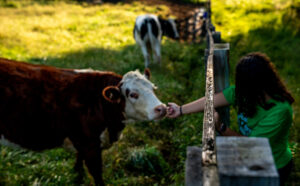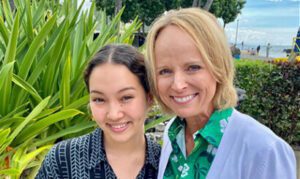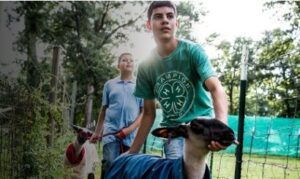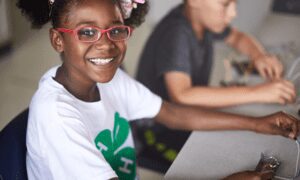Thank you so much for talking with me today, Regina. It was wonderful to meet you at the U.S. Hispanic Chamber of Commerce Foundation Summit in D.C.
Regina Heyward (RH): Absolutely. I think we immediately connected the moment you told me you were from 4‑H.
I agree! How did you first get involved in 4‑H?
RH: My parents raised me with a focus on education, a strong work ethic and an appreciation for the environment, so they really embraced 4‑H. I think by middle school my sisters and I were going to the local extension office for after-school programs, and I was a frequent participant in 4‑H summer camp. It gave us opportunities to learn about lots of different things—dental hygiene, raising plants, I was even on a livestock-judging team. Today, when I walk into a room as an African-American female, and I’m asked, “Tell us something we don’t know about you,” I say that I judged livestock. That surprises people.
What kind of skills and values did you learn from those 4‑H experiences?
RH: 4‑H really honed my public speaking skills, which later helped catapult my career. To be an effective public speaker, you have to be confident, and one reason that 4‑H is such a great program is that it helps build self-esteem in students. 4‑H gave me opportunities to stand in front of a panel of judges and talk about a subject I had researched. I would compete against young people from other schools and other counties.
Those experiences gave me an ability to step outside of my comfort zone and take on new challenges, which helped set me apart when I went to college and law school.
It sounds like 4‑H had an impact on where you are today.
RH: Yes, I think about that often. I really consider 4‑H and the people I met through it to be one of the key aspects as to why I ended up where I did. It absolutely influenced my passion and my skillset.
The appreciation for agriculture led me to study agricultural economics in college, and I had opportunities to work on international research projects and publish papers about sustainability. That path led me to work in Asia, Brazil and Europe on ensuring that corporate America has practices in place to contribute to positive development.
Has 4‑H changed much since you were in it?
RH: A lot about 4‑H today reminds me of the 4‑H that I was a part of. It’s still serving youth in urban and rural communities across the nation, tackling some of the top issues that we are facing as a society. There has been a shift, a bit, in the kinds of issues we’re looking at. For instance, there’s more focus on preparing girls to be leaders and developing their self-esteem.
There is also more focus on science, technology, engineering and math (STEM). Those subjects are an essential need not only from a business/community standpoint but an economic viability standpoint. It makes me very proud to see that 4‑H is playing a role in some of the real issues that are facing society. We need more organizations like 4‑H that are rolling their sleeves up and really getting into creative solutions that are going to help us win as an overall society.
Can you share some of the challenges you have faced as an African-American woman in business?
RH: I’ve spent most of my career as probably one of two African Americans in the room. But when it became real to me was when I started working in China. I got off the plane in Shanghai, and all of a sudden I was the only American, the only Black person, and the only woman over 5’ 8”. I was looking around, thinking, “It doesn’t get any more ‘only’ than this!”
Here’s what I learned: There are people everywhere who will help you and people who will extend kindness to you. What I had to do was find those individuals who cared about the same things I did and who didn’t treat my diversity or my difference as an impediment to me. My strategy is to work to find common ground or shared interests. If I align myself with the people who understand who I am and I understand who they are, I won’t have a problem. Now, I’ve had a few situations where it was pretty tough to get to the commonality. Or it might take a little bit of time. But I’ve become really good at figuring it out.
Sometimes the commonality is that we both enjoy fishing or we both like football! Whatever it is I’m going to find it, and we’re going to start from that point, and we’ll deal with everything else as we go.
How does the topic of inclusion in business relate to education and youth development?
RH: I think youth development requires an environment where everybody is encouraged, and that’s what’s at the heart of inclusion. Whether you’re in a 4‑H meeting or a board meeting, when individuals from diverse backgrounds and have varied expertise welcome ideas, that’s key to ending up with optimal results.
















